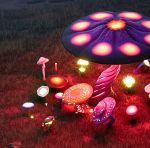A new frontier in mental health treatment, says Dr Sara Tookey
Perhaps you've heard the term "psychedelics" being discussed more openly across mainstream spaces lately? This is largely due to a phenomenon known as the ‘Psychedelic Renaissance’ - which has been gaining momentum, capturing the attention of scientists, mental health professionals, policymakers and the general public.
Psychedelics have been around for thousands of years - held as sacred by many cultures and demonised by others.
While research in the 1950s showed promising therapeutic potential, the ‘War on Drugs’ halted studies for decades. Now we're seeing a major scientific renaissance, with researchers rigorously re-examining these compounds as potential breakthrough treatments for conditions like depression, anxiety, OCD, PTSD, addiction, anorexia, and existential distress.
Studies found psilocybin-assisted therapy sessions can rapidly reduce anxiety and depression symptoms in participants, with lasting results.
MDMA-assisted therapy has shown remarkable effectiveness in treating PTSD, including hard to treat cases with dissociative experiences.
Unlike conventional antidepressants requiring daily use, psychedelics may yield durable relief after limited doses. Many participants describe their sessions as among life's most meaningful experiences. How many would say that about SSRI-effects?
How psychedelic-assisted therapy works
While we're still learning how psychedelics create therapeutic change, research suggests they may:
- Relax engrained thought patterns by reducing activity in the brain's default mode network
- Increase empathy and emotional openness
- Temporarily reopen periods when the brain is highly receptive to learning
The widely accepted theory of "Set and Setting" highlights how psychological mindset and environmental context profoundly influence outcomes. Proper preparation, supportive environments, and integration practices are essential for therapeutic benefits.
Integration & Preparation
Psychedelic experiences alone aren't therapy. Success requires:
Thorough preparation
A trusting therapeutic relationship
Dedicated integration work afterward
Ongoing therapeutic guidance
For mental health professionals and clients interested in learning more
Mental health professionals can ethically and responsibly address psychedelic use in their practice by staying informed and seeking appropriate resources.
1. Stay informed about ongoing research and clinical trials.
2. Understand harm reduction principles and provide a stigma-free space that allows clients to speak openly about their interest in psychedelic-assisted therapies.
3. Consult with your professional registering bodies to ensure you are working within an agreed legal and ethical framework with your clients.
4. Know when and how to make appropriate referrals
5. Learn about integration practices and psychedelic-informed therapy.
6. Join supportive communities for discussing and integrating non-ordinary states of consciousness.
7. Prioritise safety, ethics, and well-being when considering psychedelic-assisted therapies.
While promising, psychedelic-assisted therapies are still being researched and are not yet widely available as standard treatments.
As the landscape of mental health treatment evolves, so too must our approaches as mental health professionals.
Harm reduction in the context of psychedelic use is not about encouraging illegal activity, but about ensuring the safety and wellbeing of our clients in a changing world.
This information is for educational purposes only. Always consult with qualified healthcare providers for personalised advice and treatment options.
Dr Sara Tookey is a Clinical Psychologist and founder of True North Psychology, specialising in psychedelic-informed therapy and integration support as well as neurodiversity affirming assessment and therapy, existential crises and trauma. She practises from our Richmond and Twickenham centres. www.truenorth-psychology.com





